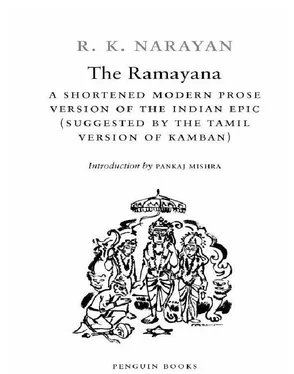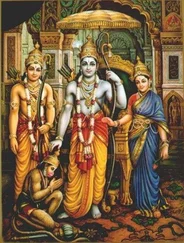Махариши Вальмики - The Ramayana
Здесь есть возможность читать онлайн «Махариши Вальмики - The Ramayana» весь текст электронной книги совершенно бесплатно (целиком полную версию без сокращений). В некоторых случаях можно слушать аудио, скачать через торрент в формате fb2 и присутствует краткое содержание. Жанр: Старинная литература, на английском языке. Описание произведения, (предисловие) а так же отзывы посетителей доступны на портале библиотеки ЛибКат.
- Название:The Ramayana
- Автор:
- Жанр:
- Год:неизвестен
- ISBN:нет данных
- Рейтинг книги:3 / 5. Голосов: 1
-
Избранное:Добавить в избранное
- Отзывы:
-
Ваша оценка:
- 60
- 1
- 2
- 3
- 4
- 5
The Ramayana: краткое содержание, описание и аннотация
Предлагаем к чтению аннотацию, описание, краткое содержание или предисловие (зависит от того, что написал сам автор книги «The Ramayana»). Если вы не нашли необходимую информацию о книге — напишите в комментариях, мы постараемся отыскать её.
The Ramayana — читать онлайн бесплатно полную книгу (весь текст) целиком
Ниже представлен текст книги, разбитый по страницам. Система сохранения места последней прочитанной страницы, позволяет с удобством читать онлайн бесплатно книгу «The Ramayana», без необходимости каждый раз заново искать на чём Вы остановились. Поставьте закладку, и сможете в любой момент перейти на страницу, на которой закончили чтение.
Интервал:
Закладка:
And then Vasishtha explained, “In order to end a prolonged drought, the King of Anga was advised to get Rishya Sringa to visit his country, since it always rained in his proximity; but they knew that on no account would he consent to leave his mountain retreat. While the King was considering how to solve the problem, a bevy of beauties offered their services and went forth in search of this young sage. They reached his hermitage, found him alone, and enticed him away to Anga. He had never seen any human being except his father, and could not make out what these creatures were, when the damsels from Anga surrounded him. But given time for instinct to work, he became curious and abandoned himself to their care. They represented themselves as ascetics, invited him to visit their hermitage, and carried him away.” (In Mysore State at Kigga, four thousand feet above sea level, a carving on a temple pillar shows the young recluse being carried off on a palanquin made of the intertwined arms of naked women.) “On his arrival at Anga, the rains came. The King was pleased, rewarded the ladies, and persuaded the young man to marry his daughter and settle down at his court.”
Dasaratha journeyed to Anga and invited the sage to visit Ayodhya. A sacrifice was held under his guidance; it went on for one full year, at the end of which an immense supernatural being emerged from the sacrificial fire bearing in his arms a silver plate with a bolus of sacramental rice on it. He placed it beside King Dasaratha and vanished back into the fire.
Rishya Sringa advised the King, “Take the rice and divide it among your wives and they will have children.” In proper time, Dasaratha’s wives, Kausalya and Kaikeyi, gave birth to Rama and Bharatha respectively, and Sumithra gave birth to Lakshmana and Sathrugna.
Dasaratha’s life attained a fuller meaning, and he felt extremely happy as he watched his children grow. At each stage, he engaged tutors for their training and development. In course of time, every morning, the young men went to the groves on the outskirts and learned yoga and philosophy from the adepts residing there. Late in the evening, after the lessons, when the princes returned to the palace on foot, the citizens crowded the highway to have a glimpse of them. Rama always had a word for everyone in the crowd, inquiring, “How are you? Are your children happy? Do you want any help from me?” They always answered, “With you as our prince and your great father as our guardian, we lack nothing.”
1
RAMA’S INITIATION
The new assembly hall, Dasaratha’s latest pride, was crowded all day with visiting dignitaries, royal emissaries, and citizens coming in with representations or appeals for justice. The King was always accessible, and fulfilled his duties as the ruler of Kosala without grudging the hours spent in public service.
On a certain afternoon, messengers at the gate came running in to announce, “Sage Viswamithra.” When the message was relayed to the King, he got up and hurried forward to receive the visitor. Viswamithra, once a king, a conqueror, and a dreaded name until he renounced his kingly role and chose to become a sage (which he accomplished through severe austerities), combined in himself the sage’s eminence and the king’s authority and was quick tempered and positive. Dasaratha led him to a proper seat and said, “This is a day of glory for us; your gracious presence is most welcome. You must have come from afar. Would you first rest?”
“No need,” the sage replied simply. He had complete mastery over his bodily needs through inner discipline and austerities, and was above the effects of heat, cold, hunger, fatigue, and even decrepitude. The King later asked politely, “Is there anything I can do?” Viswamithra looked steadily at the King and answered, “Yes. I am here to ask of you a favour. I wish to perform, before the next full moon, a yagna at Sidhasrama. Doubtless you know where it is?”
“I have passed that sacred ground beyond the Ganges many times.”
The sage interrupted. “But there are creatures hovering about waiting to disturb every holy undertaking there, who must be overcome in the same manner as one has to conquer the fivefold evils 4within before one can realize holiness. Those evil creatures are endowed with immeasurable powers of destruction. But it is our duty to pursue our aims undeterred. The yagna I propose to perform will strengthen the beneficial forces of this world, and please the gods above.”
“It is my duty to protect your sublime effort. Tell me when, and I will be there.”
The sage said, “No need to disturb your august self. Send your son Rama with me, and he will help me. He can.”
“Rama!” cried the King, surprised, “When I am here to serve you.”
Viswamithra’s temper was already stirring. “I know your greatness,” he said, cutting the King short. “But I want Rama to go with me. If you are not willing, you may say so.”
The air became suddenly tense. The assembly, the ministers and officials, watched in solemn silence. The King looked miserable. “Rama is still a child, still learning the arts and practising the use of arms.” His sentences never seemed to conclude, but trailed away as he tried to explain. “He is a boy, a child, he is too young and tender to contend with demons.”
“But I know Rama,” was all that Viswamithra said in reply.
“I can send you an army, or myself lead an army to guard your performance. What can a stripling like Rama do against those terrible forces . . . ? I will help you just as I helped Indra once when he was harassed and deprived of his kingdom.”
Viswamithra ignored his speech and rose to leave. “If you cannot send Rama, I need none else.” He started to move down the passage.
The King was too stricken to move. When Viswamithra had gone half way, he realized that the visitor was leaving unceremoniously and was not even shown the courtesy of being escorted to the door. Vasishtha, the King’s priest and guide, whispered to Dasaratha, “Follow him and call him back,” and hurried forward even before the King could grasp what he was saying. He almost ran as Viswamithra had reached the end of the hall and, blocking his way, said, “The King is coming; please don’t go. He did not mean . . .”
A wry smile played on Viswamithra’s face as he said without any trace of bitterness, “Why are you or anyone agitated? I came here for a purpose; it has failed; no reason to prolong my stay.”
“Oh, eminent one, you were yourself a king once.”
“What has that to do with us now?” asked Viswamithra, rather irked, since he hated all reference to his secular past and wanted always to be known as a Brahma Rishi.
Vasishtha answered mildly, “Only to remind you of an ordinary man’s feelings, especially a man like Dasaratha who had been childless and had to pray hard for an issue. . . .”
“Well, it may be so, great one; I still say that I came on a mission and wish to leave, since it has failed.”
“It has not failed,” said Vasishtha, and just then the King came up to join them in the passage; the assembly was on its feet.
Dasaratha made a deep obeisance and said, “Come back to your seat, Your Holiness.”
“For what purpose, Your Majesty?” Viswamithra asked.
“Easier to talk seated . . .”
“I don’t believe in any talk,” said Viswamithra; but Vasishtha pleaded with him until he returned to his seat.
When they were all seated again, Vasishtha addressed the King: “There must be a divine purpose working through this seer, who may know but will not explain. It is a privilege that Rama’s help should be sought. Do not bar his way. Let him go with the sage.”
“When, oh when?” the King asked anxiously.
“Now,” said Viswamithra. The King looked woebegone and desperate, and the sage relented enough to utter a word of comfort. “You cannot count on the physical proximity of someone you love, all the time. A seed that sprouts at the foot of its parent tree remains stunted until it is transplanted. Rama will be in my care, and he will be quite well. But ultimately, he will leave me too. Every human being, when the time comes, has to depart and seek his fulfillment in his own way.”
Читать дальшеИнтервал:
Закладка:
Похожие книги на «The Ramayana»
Представляем Вашему вниманию похожие книги на «The Ramayana» списком для выбора. Мы отобрали схожую по названию и смыслу литературу в надежде предоставить читателям больше вариантов отыскать новые, интересные, ещё непрочитанные произведения.
Обсуждение, отзывы о книге «The Ramayana» и просто собственные мнения читателей. Оставьте ваши комментарии, напишите, что Вы думаете о произведении, его смысле или главных героях. Укажите что конкретно понравилось, а что нет, и почему Вы так считаете.












